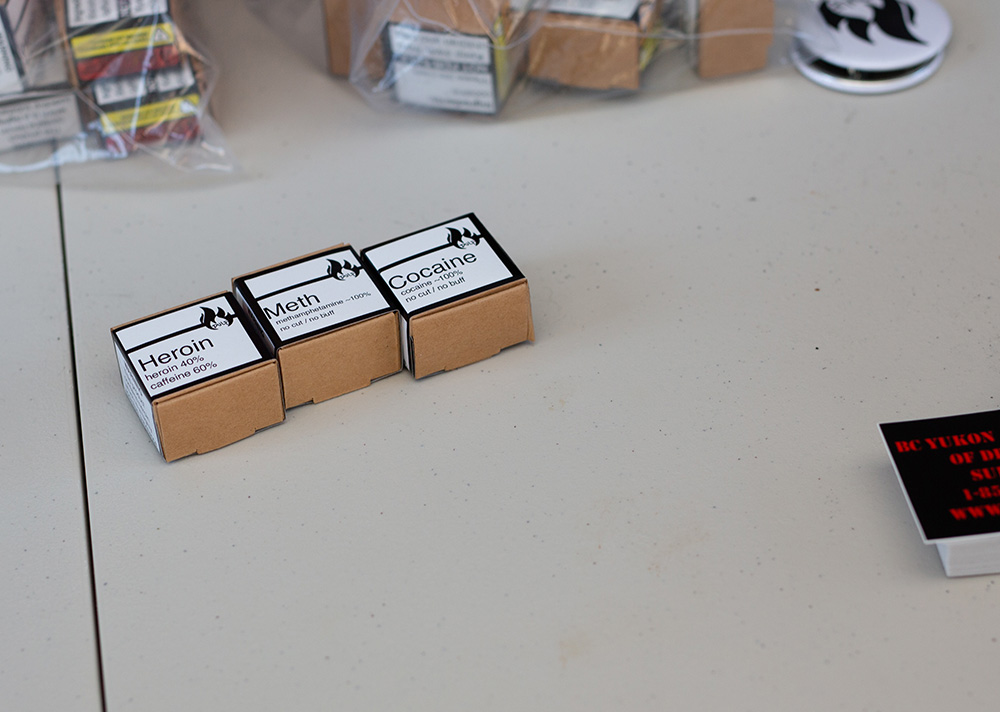The Vancouver Police arrested Eris Nyx and Jeremy Kalicum, the co-founders of the Canadian Drug User Liberation Front (DULF), on Wednesday 25 October, for allegedly trafficking cocaine, heroin and methamphetamine. DULF’s offices were raided, along with two homes of people associated with the organisation. While Nyx and Kalicum were released in the same evening of their arrest, they await further investigation in January.
The Vancouver Police Department (VPD) issued a statement on the arrests, claiming that “we have always warned that anyone who violates the Criminal Code or the Controlled Drugs and Substances Act could face enforcement… we have now taken action to stop it,” stated Inspector Phil Heard, commanding officer of VPD’s Organised Crime Section.
An open letter has been put together by Canadian drug policy activists, calling for an end to the criminalisation of community-regulated safe supply, a restoration of DULF’s funding from VCH, and to formally protect the right to community-based safe supply in British Columbia.
DULF’s compassion club model
According to Garth Mullins, former Board member of Vancouver Area Network of Drug Users (VANDU) and founding member of DULF, the organisation was formed in the spring of 2020, as a response to a rampant rise in overdose deaths across Canada. Throughout 2021, they operated as a “fulfilment centre and compassion club”: using community funds, DULF purchased drugs from the darknet, tested and repackaged them into individual doses for distribution among their drug-using community. This non-medicalised, community-based model of safe supply not only demonstrated the value of a radical model of community care, but it also provided people with the assurance that their drugs are devoid of lethal adulterants, removing much of the unpredictable harms associated with the illegal drug market.
While they first provided general harm reduction services, they applied in September 2021 to the federal government for an exemption from the Controlled Drugs and Substances Act to operate a compassion club, where they would purchase wholesale and distribute cocaine, heroin and methamphetamine for people using drugs in Vancouver. However, they have been distributing drugs through this model for Vancouver residents from as early as April 2021, timing drug distributions with the publication of British Columbia’s overdose rates. By September 2021, they had distributed over 100 grams of drugs, with no known overdoses associated to this supply.
DULF’s research into the people accessing their compassion club also tracked that those participating in the club saw a 48% decrease in negative police interactions, 50% decrease in hospitalisations in the past three months, and a 39% decrease in drug-related violence. This is welcome news given the toxicity of the drug supply in Canada: in 2022, 2,342 lives were lost to opioid overdoses in British Columbia, where DULF operates. Around 85% of all drug-related deaths in Canada have had fentanyl or its analogues involved, a stark reminder of the state of the adulterated drug supply.
“DULF’s work was an open secret”
DULF co-founder Kalicum admitted in an interview that DULF had always had a complicated relationship with the government and Vancouver Police force. Zoë Dodd, a community organiser with Toronto Overdose Prevention Society, also told TalkingDrugs: “DULF’s work has always been an open secret. They have operated for a few years already.”
And while DULF did distribute drugs among the community, they had applied for an exemption from the Canadian Controlled Substances Act in September and October 2021 to run their compassion club above board. However, when their application was rejected in March 2022, they continued to purchase and distribute drugs given the alarming rates of drug-related deaths, mostly from poisonings. As Nyx said in an interview, “the exposure to death causes you to do radical things”.
What seems to have led to last week’s arrests was that DULF had an ongoing contract with the Vancouver Coastal Health (VCH) public authority, which gave them CAD$200,000 of public funding in 2021-2022 to provide “drug checking, overdose prevention training, and harm-reduction services” to people using drugs. However, this contract was terminated on 2 October when Mental Health and Addictions Minister Jennifer Whiteside told VCH that their money was being used for illegal purposes. DULF’s raids and arrests came soon after.
Mullins gave TalkingDrugs some insights into DULF’s motivations.
“We never set out to be outlaws. We wanted to have relationships with pharmaceutical companies to get pharmaceutical grade drugs to distribute… But the federal government denied it, so we were forced into a corner.”
He also clarified that public funds from VCH were never used for drug purchases.
“DULF was contracted to run an overdose prevention site [by VCH]. All the money used to buy drugs on the darknet was done with community money, not public funds. You can’t just take government money and turn it into cash [for buying drugs],” he explained.
However, these separate funding streams were not enough to prevent the defunding and subsequent arrests of DULF’s operations.
Safe supply under attack
The Government’s safe supply programme of opioids (mostly hydromorphone), which has been running nationally since August 2019, has consistently been under attack by conservative political groups in Canada. DULF was specifically targeted by the BC United, a provincial neoliberal centre-right political party, which condemned VCH’s funding of DULF, framing their entire actions as illegal and calling for a deeper investigation: “it is unacceptable that public money is being used to purchase illicit drugs in any way that supports organized crime.” BC United’s alternative plan to address drug-related harms in BC included more police and prosecution policies for drug offences.
Pierre Poilievre, the leader of the Conservative Party, has very publicly opposed safe supply. Calling it “tax-funded drug supply”, he claimed these initiatives fund addiction rather than recovery. He additionally tabled a bill to defund safe supply programme earlier this year, which failed to pass.
BC United has also argued that the government’s supply of hydromorphone is driving drug deaths, a claim that has been disproven by the BC coroners office.
“You know how every few years there’s a dirty word on the media coverage of drugs? It used to be heroin, fentanyl… now in Canada, Dilaudid [hydromorphone] is a scary word,” Mullins noted.
Dodd told TalkingDrugs that the reality is that while hydromorphone works for some, the lack of government products is limiting its impact.
“I wouldn’t say [safe supply] working. It’s under such political scrutiny that doctors are afraid to prescribe… and it’s not necessarily the drugs people want access to. For some people this model works, but people should have access to an array of options that works for them.”
Drug-user led initiatives have historically been successful in ensuring significant uptake by the community, be it for needle and syringe programmes, or to share safer drug use practices. Community-based safe supply not only deals with adulterants through extensive testing, it meets people at their current state, providing them with a safe supply of the drugs they are using, rather than an undesired alternative.
The timing of the DULF arrests seems to indicate that the tides of political support for safe supply may be changing. This is in line with a wider attack on decriminalisation and other progressive drug policies across North America, which may overturn many hard-won victories of drug user movement in Vancouver.
However, the radical nature of DULF and other drug activists in Vancouver means that this fight is far from over. The community’s open letter has already attracted thousands of signatures, and will begin raising funds for Nyx’s and Kalicum’s legal defence.
As Mullins put it, “We will fight like hell to raise funds for DULF because we believe safe supply saves lives.”


